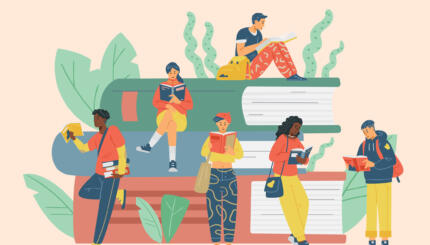During the weeks preceding Israeli Independence Day and for some time afterward, the Israeli flag is proudly displayed in front of the homes of most of my neighbors. Little plastic flags flutter in the wind on the roads, attached to the windows of many if not most of the passing Israeli cars.
On election day – and we have had three of them in the not-so-distant past – the polling station to which I am assigned to vote is in the community hall less than a five-minute walk from my home. Advocates for the many Israeli political parties stand outside and distribute literature in order to sway those who have not yet made up their minds, while inside representatives of the Israeli Elections Committee make sure that everything is conducted according to the rules. An Israeli policeman stands guard to keep the peace.
The official postcard that I present when voting, sent by that same Israeli Elections Committee, reached me through the branch of the Israeli Post Office right there on the other side of the town square, opposite the community hall. I get all my mail there. When a letter comes for me from across the Atlantic – although there are very few of them in this digital age – the bottom line of the address says ‘Israel.’ And once in a blue moon when I send a letter by snail mail to the US, the return address that I place in the upper left-hand corner of the envelope says ‘Israel’ as well.
If I need a new Israeli passport or want to update my officially recognized address, I have a very short car ride to the local branch of the Israeli Ministry of the Interior, located just across the road one town over. Or if I need the services of Israeli Social Security, I can take care of it in the same shopping center.
My wife teaches in the Israeli school system. Her school is a ten-minute walk from our home. Israeli income tax is directly deducted from her salary by the Israeli government. The Israeli health tax is also deducted from her salary. The Israeli national health fund clinic where we go for our medical treatment is situated in the same town square where the post office and the polling station are.
All of these very banal elements of my everyday life would be unexceptional were I to reside within the borders of the State of Israel. But I don’t. I live across the Green Line in the Israeli settlement of Alon Shvut, Gush Etzion, a half-hour drive south of Jerusalem, approximately equidistant between the Biblical cities – that are today large, bustling Palestinian cities – of Bethlehem and Hebron.
My neighbors call where we live Judea and Samaria. So do I. Many Israelis and internationals call it the West Bank. Others less friendly to Israel settlement call it Palestine. But whatever you call it, the simple fact is that Israel never annexed the territory. It was conquered in the Six-Day War over 50 years ago and to this day Israel defines it as a disputed territory that is not legally part of the State of Israel.
The legal mechanism through which Israel rules it is military law, and under that rubric, a hodgepodge of ad hoc military orders, administrative workarounds, and various manipulations have purposefully and successfully managed to create for Israeli citizens the illusion of normal life within the State of Israel. But only for Israeli citizens, that is to say, Jews. The indigenous Palestinians – the vast majority of the population – are accorded no such benefits. Lacking citizenship in the State of Israel, they are ruled by a different set of military orders, ones designed to keep an enemy population under control and that in many instances do not provide for basic human rights. Like fingers and sometimes like freckles, the State of Israel has de facto extended itself beyond its borders, but only for those who are its citizens.
It is an elaborate ruse, effectively creating an apartheid-like situation without having to call it such. The thing is, we have been taken in by our own ruse. We Israeli settlers sincerely believe that we live in a democratic Israel. We have engineered such an Israeli bubble – with all the trappings of life in democratic Israel – that we don’t see those who are outside of it, even when they are right under our noses.
As I have often noted, for the vast majority of us Israeli settlers, the Palestinians are transparent. We do not see them as significant human players. They are like the gray scenery that passes in the distant background of a movie. There is no need to take them into account as anything but a security threat.
We settlers, not so much different from most Israeli Jews, seem blissfully unaware of what we are doing to the Palestinians of the West Bank and Gaza. We just don’t see the injustice, the inequality, the suffering that we are causing, much of it gratuitous.
But how can we not see? Especially for us settlers, who literally live among the Palestinians, how could we not notice what we are doing to them? It is right in front of our eyes. How can we just go on with our daily lives and let it happen? How can we live with ourselves?
Many and varied are the psychological mechanisms and machinations that we use to allow ourselves to put our heads in the sand and to go on with our daily lives. Some are not dissimilar from those researched by American scholars of racial privilege. I would like to make my own attempt at a contribution towards understanding how good, moral people – my neighbors, my teachers, my rabbis (and even myself for most of my life!) – can tolerate such an abomination right under their noses.
I would like to suggest that one part of the puzzle is that the identical factors that to a large degree make up the mechanism of the injustice, at the same time help create the psychological reality that lulls us into tolerating it. That is, our sense that we live in the State of Israel and not in the geographical area where the Palestinians live is what allows us to distance ourselves from what is happening outside the State of Israel, even while it is just down the block. We are not part of our local environment. What is happening to the Palestinians is happening far away in a different country, and it need not concern us.
We read Israeli newspapers and we listen to Israeli radio and television, meant for the citizens of the State of Israel. Mainstream Israeli media almost never covers the daily life of the local Palestinians in Judea and Samaria (When I say ‘almost’ I err on the side of caution, but am pretty certain that that word is unnecessary). Mainstream media mentions them only in the context of security threats and as dangerous enemies. And there are no media that fills the lacuna. There is no such thing as local media in the sense of coverage of the lives of people who live in the same geographical areas. (The only local media is Israeli in the full sense of the word, meant for local Israeli citizens and covering life within the boundaries of the settlements.)
In other words, at best the media makes the Palestinians distant and invisible, even while they live right down the street.
But it appears to me that the situation is actually much worse. Mainstream Israeli media do mention Palestinians, just not those who are our neighbors in Judea and Samaria. There is a fair amount of coverage – although not enough – of Palestinians who live within the Green Line and are citizens of our state. Many of us refer to them as the Arab citizens of Israel. We hear that they attend Israeli universities, and that the Israeli government has a plan to increase their standard of living, for example. We learn that they are doctors in Israeli hospitals and pharmacists at our health clinics. They vote in our national elections and over a dozen of them serve in our Knesset. They pay the same Israeli taxes as we do and receive the same Israeli Social Security benefits.
What may happen is that we make an unconscious equation in our minds: Palestinians who are good have it good, and Palestinians who are bad have it bad. If there are Palestinians that are suffering, they must deserve it. Those who are loyal citizens of our country are amply rewarded for their upright behavior while the terrorists get what is coming to them. What gets lost in the shuffle is of course the fact that there is no freedom of choice and no meritocracy: The ‘bad Palestinians’ – the vast majority of which have no connection at all to terrorism – live stateless under our military occupation, are denied basic human rights by us, and have no hope for a better future – courtesy of the system that we have engineered.
Paradoxically, at the same time, some of us may subliminally think of those we see on the news when we think about our local Palestinian neighbors at all. We see the local Palestinians with our eyes but we process what we see through the filters of what we know from the media about the reality of our country. And so we assume that all the Palestinians have it fine. Many of the politically naïve among us may even assume – without really thinking about it – that they all hold citizenship and vote.
Of course, were we to actually give it a moment of thought, we would realize that such is not the case, but it is much more comfortable not to give it that moment of thought. Clearly this bias is extremely self-serving, but it is aided and facilitated by the reality on the ground.
I love my home and my community. Like in other settlements in Judea and Samaria, the human fabric is close-knit. People know each other and care for each other, both in times of joy and celebration and in times of sickness and sadness. Religious life is tremendously vibrant. But the fact remains that we have built communities – through a sophisticated system of social and legal engineering – that are completely disengaged from the human landscape in which we have placed them. They were not meant to be immoral, but on one level that is what they have become as a result of the system that we have created.
So much needs to be changed on the legal and political level. But there must also be change on the local, community level. We must break out of our bubble and create connections with our human surroundings. We must move from a model of separation to a model of partnership. We must engage with our neighbors in order to see them and to empathize with them. We have lovingly embraced the land of Judea and Samaria; now we must embrace the people of Judea and Samaria as well.



